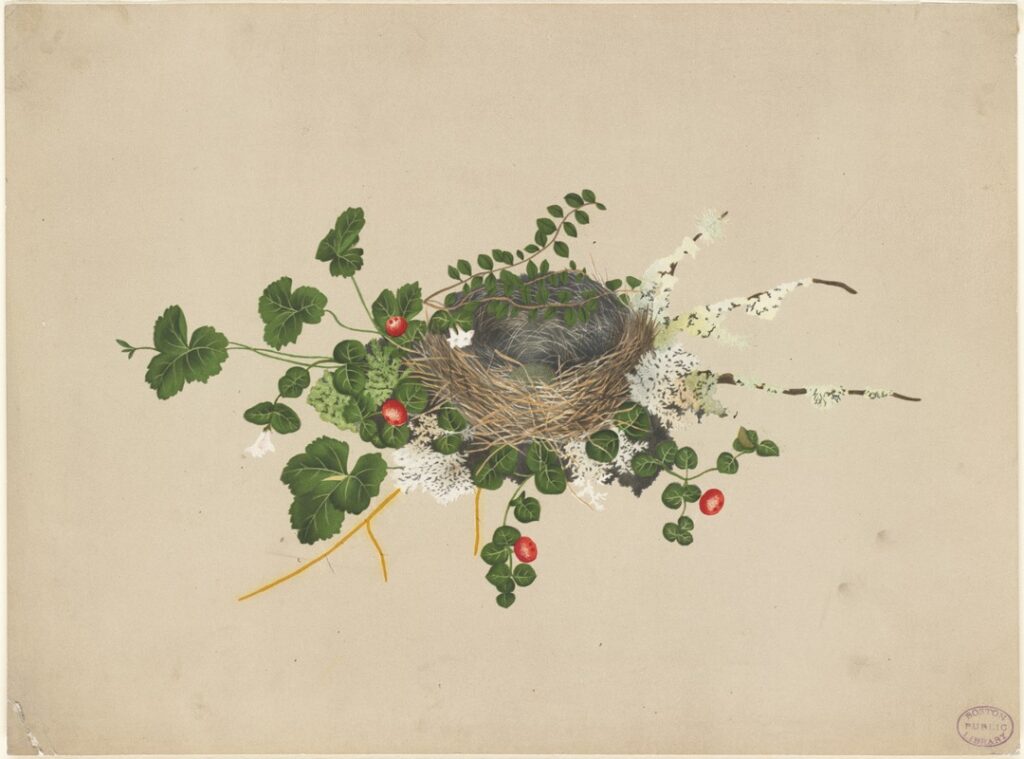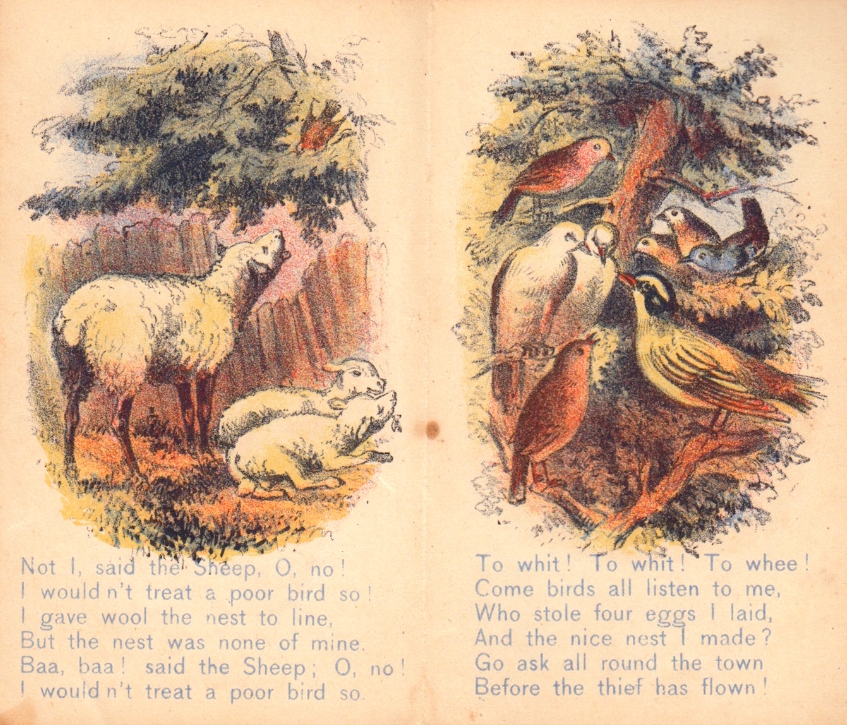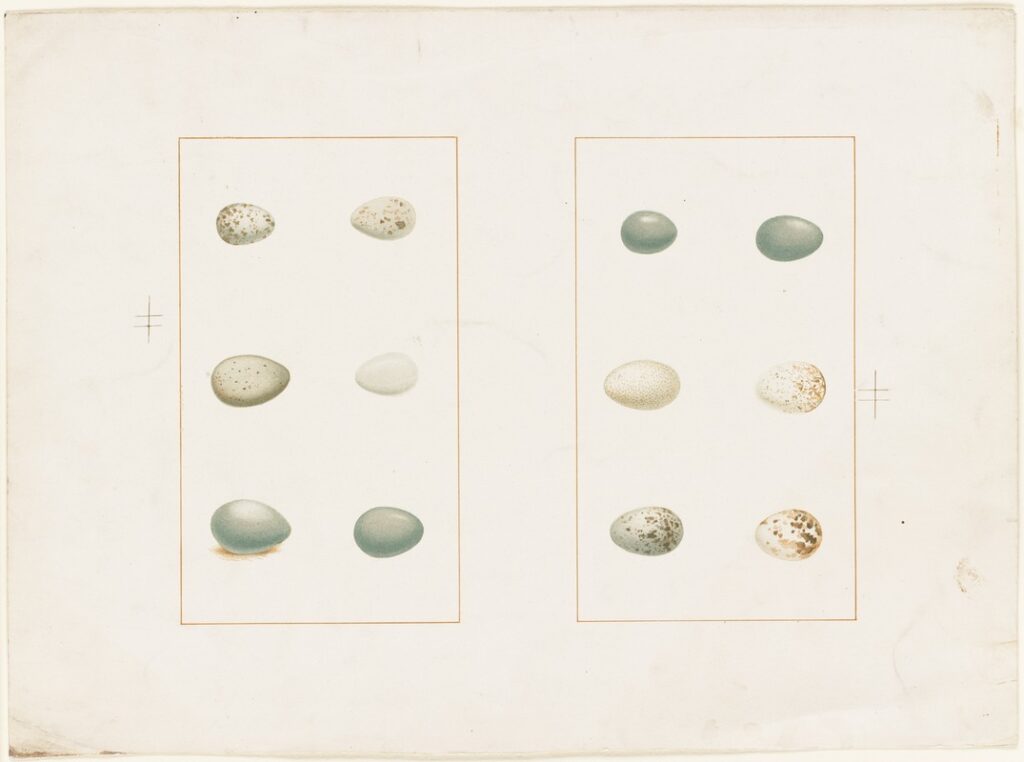Who Stole the Bird’s Nest
By Lydia Maria Child
Annotations by Rene Marzuk

“To whit! To whit! To whee! Will you listen to me? Who stole four eggs I laid, And the nice nest I made?” “Not I,” said the cow, “moo, oo, moo, oo! Such a thing I’d never do. I gave you a wisp of hay, But didn’t take your nest away: Not I,” said the cow, “moo, oo, moo, oo! Such a thing I’d never do!” “To whit! To whit! To whee! Will you listen to me? Who stole four eggs I laid, And the nice nest I made?” “Bobolink! Bobolink! Now, what do you think? Who stole a nest away From the plum tree to-day?” “Not I,” said the dog, “bow wow! I couldn’t be so mean, I trow– I gave hairs the nest to make, But the nest I did not take. Not I,” said the dog, “bow wow! I couldn’t be so mean I trow.” “To whit! To whit! To whee! Will you listen to me? Who stole four eggs I laid, And the nice warm nest I made?” “Bobolink! Bobolink! Now, what do you think? Who stole a nest away From the plum tree to-day?” “Coo, coo! Coo, coo! Coo, coo! Let me speak a word, too– Who stole that pretty nest From little yellow-breast?” “Not I,” said the sheep, “oh, no! I would not treat a poor bird so. I gave wool the nest to line, But the nest was none of mine: Baa, baa,” said the sheep, “oh, no! I wouldn’t treat a poor bird so.”

“To whit! To whit! To whee!
Will you listen to me?
Who stole four eggs I laid,
And the nice nest I made?”
“Bobolink! Bobolink!
Now, what do you think?
Who stole a nest away
From the plum tree to-day?”
“Coo, coo! Coo, coo! Coo, coo!
Let me speak a word, too–
Who stole that pretty nest
From little yellow-breast?”
“Caw, caw,” cried the crow,
I should like to know,
What thief took away
A bird’s nest to-day?”
“Cluck, cluck,” said the hen,
“Don’t ask me again,
Why! I haven’t a chick
That would do such trick.
We all gave her a feather,
And she wove them together.
I’d scorn to intrude
On her and her brood:
Cluck, cluck,” said the hen,
“don’t ask me again.”
“Chirr-a-whirr! Chirr-a-whirr!
All the birds make a stir!
Let us find out his name,
And all cry: ‘For shame!’”
“I would not rob a bird,”
Said little Mary Green;
“I think I never heard
Of anything so mean.”
“’T is very cruel, too,”
Said little Alice Neal;
“I wonder if he knew,
How sad the bird would feel!”
A little boy hung down his head,
And went and hid behind his bed;
For he stole that pretty nest,
From poor little yellow-breast;
And he felt so full of shame,
He didn’t like to tell his name.

CHILD, LYDIA MARIA. “WHO STOLE THE BIRD’S NEST,” IN STORIES FOR LITTLE CHILDREN, COMPILED BY SUSAN S. HARRIMAN, 117-21 [VOLUME ONE OF THE KINDERGARTEN CHILDREN’S HOUR, ED. BY LUCY WHEELOCK]. BOSTON, NEW YORK: HOUGHTON MIFFLIN COMPANY, 1920.
Contexts
Lydia Maria Child’s “Who Stole the Bird’s Nest?” was initially published in 1844 in the second volume of Child’s Flowers for Children. Its inclusion in Lucy Wheelock’s anthology for kindergarteners, more than seventy years later, attests to Child’s cultural influence and to the timelessness of the conservation drive that animates her poem.
Wheelock (1857-1946), main editor of the The Kindergarten Children’s Hour, was at one point the president of the International Kindergarten Union. Through her pedagogical practice, she supported the kindergarten reform in the United States and helped bridge early disagreements about how to teach 5-year-olds. She believed that kindergarten education could help tackle the cycle of poverty, a concern that remains relevant today.
The Kindergarten Children’s Hour was comprised of five illustrated volumes. Susan S. Harriman was in charge of the first one, a collection of stories and rhymes for little children. In the second, Maude C. Nash suggests home activities, while in the third Winthrop Packard turns her interactions with her own children in a series of “Talks to Children.” Following a logical progression, the fourth volume consisted of “Talks to Mothers.” In the fifth and final book, Alice Wyman anthologized songs and music for children.
Definitions from Oxford English Dictionary:
trow: To believe in or on; to have confidence in; to trust to. Obsolete or rare (archaic).
wisp: A handful, bunch, or small bundle (of hay, straw, grass, etc.).
Resources for Further Study
- In addition to being a writer, Lydia Maria Child was also a prominent abolitionist and activist. She is one of the inductees at the National Abolition Hall of Fame and Museum.
- Carolyn L. Karcher’s The First Woman in the Republic.
- Lydia Moland’s Lydia Maria Child: A Radical American Life.
Contemporary Connections
There is nothing birds will not try to integrate into their nests! Learn how to help them build safer nests by making safe materials available to them.
And here is what to do if you find a nest where it may not belong.